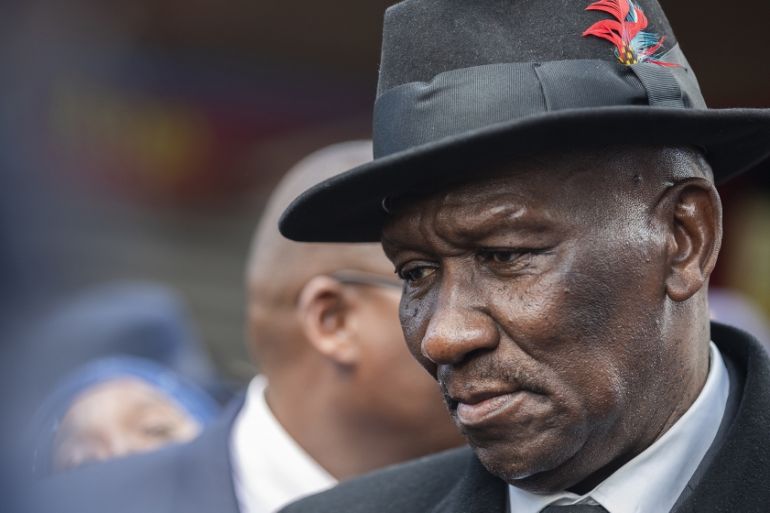S Africa court issues orders to end police abuse during lockdown
Praise for court order compelling gov’t ministers to stop security forces’ brutality following death of Collins Khosa.

Human rights groups and experts have welcomed a series of orders issued by a South African court that compel authorities to prevent police and army brutality during the enforcement of a lockdown meant to curb the spread of coronavirus.
In its judgement on Friday, the Pretoria-based High Court declared that everyone in the country is entitled to a number of human rights – including the right to life, the right not to be tortured in any way and the right not to be treated or punished in a cruel, inhuman or degrading way – even during an emergency.
Keep reading
list of 3 itemsWhat happens if you catch the new coronavirus?
Tracking Africa’s coronavirus cases
It came after an urgent application brought by the family of Collins Khosa, a father of three who died of his injuries after he was allegedly beaten by security forces on April 10, two weeks into the country’s lockdown.
The court heard from Khosa’s family that members of the South African National Defence Force (SANDF) entered his home in Johannesburg’s Alexandra township after a cup of alcohol was found in his yard. Sales of alcohol are not allowed under the coronavirus containment measures but it is not clear why the SANDF officers entered Khosa’s house.
In her affidavit, his partner Nomsa Montsha claimed that the security forces poured beer on Khosa after dragging him outside, slammed him against a cement wall and hit him with the butt of a machinegun. Afterwards, Khosa began vomiting, was unable to walk and lost consciousness. He was declared dead a few hours later. Montsha and Khosa’s brother-in-law said they were also assaulted.
Court orders
The family had approached the court seeking a number of orders to ensure the end of what they described as police and army brutality as South Africa tries to stem the spread of the coronavirus.
In the ruling, Judge Hans Fabricius said all members of the SANDF and the metro police who were at Khosa’s home or nearby should be placed on suspension.
Fabricius also gave the ministers of police and defence five days to develop and publish a code of conduct during the lockdown and to command the members of the security forces to adhere to the “absolute prohibition on torture”.
The judge further ordered that “freely accessible measures” have to be set up to enable civilians to report brutality by the security forces.
In his judgement, Fabricius cited a 2019 United Nations report on torture in South Africa which found that state institutions had not been investigating allegations of state torture promptly and impartially. According to Fabricius, the present case “seems to bear this out”.
The court also reminded the state of the moral foundations of South African democracy and the importance of the rule of law.
“The very institutions that have been created to safeguard and protect the population … are the very persons who now fail to impose the appropriate internal remedies against the transgressors,” Fabricius said.
|
|
In mid-March, South African President Cyril Ramaphosa declared a “national state of disaster” as he announced a series of drastic measures to contain the spread of the coronavirus pandemic.
On March 26, the government imposed a nationwide lockdown and began deploying tens of thousands of soldiers to support the police.
Since then, there have been several complaints alleging excessive use of force and abuse of power by security forces during the enforcement of the lockdown. At least nine deaths allegedly at the hands of police are currently under investigation.
‘Watershed moment’
Commenting on Friday’s judgement, Edwin Makwati, a legal researcher at the Legal Resources Centre, called it “a watershed moment in the adjudication of torture cases in South Africa”.
Makwati said the judgement is a “cue” for the South African government “to rectify defects in the legislative framework”, including the lack of investigative mechanisms.
According to Thomas Coggin, a senior lecturer at the University of Witwatersrand, Khosa’s case is “emblematic of larger issues” such as a lack of proper training of the police in crisis situations.
South African media commentator Eusebius McKaiser said in a radio interview that it was “astounding” and “a shame” that the court should remind the police of rights “that we should take for granted”, including the right not to be tortured.
“Accountability and a culture of justification do not go out of the window just because we are operating under the Disaster Management Act at the moment,” McKaiser added.